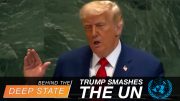“My job is not to represent the world. My job is to represent the United States of America,” President Donald Trump told a joint session of Congress Tuesday night, reemphasizing his campaign theme of putting America First.
And he pointedly told Congress and the watching American public that it is not the proper role of the United States to impose its will on other sovereign nations: “Free nations are the best vehicle for expressing the will of the people — and America respects the right of all nations to chart their own path. We know that America is better off, when there is less conflict — not more.”
While Trump stated that “We strongly support NATO,” calling it an alliance that “defeated communism,” he insisted that “our partners must meet their financial obligations,” adding that while America will respect historic institutions such as NATO, “we will also respect the sovereign rights of nations.”
Though Trump’s speech was not a formal State of the Union message, it resembled one. He was formally invited by Speaker of the House Paul Ryan (R-Wis.) to give “an address,” a first-year-in-office tradition begun by President Ronald Reagan in 1981.
The speech covered many of the same themes the new president often spoke of during his rather unorthodox campaign, which ended in his upset victory last November: rewriting global trade rules, halting illegal immigration, repealing ObamaCare, reducing government regulation of private enterprise, defeating “radical Islamic terrorism,” rebuilding the American military, and supporting the police.
“We’ve defended the borders of other nations, while leaving our own borders wide open, for anyone to cross,” Trump asserted. “By finally enforcing our immigration laws, we will raise wages, help the unemployed, save billions of dollars, and make our communities safer for everyone.”
“For that reason,” Trump continued, “we will soon begin the construction of a great wall along our southern border.”
In addition to the wall, the president said the United States will be “reforming our system of legal immigration. The current outdated system depresses wages for our poorest workers, and puts great pressure on taxpayers.” Instead, the president proposed going to a “merit-based immigration system,” as is presently used in Canada and Australia. “It is a basic principle that those seeking to enter a country ought to be able to support themselves financially,” he stated.
Trump challenged those members of Congress who “do not believe we should enforce our [immigration] laws,” by asking, “What would you say to the American family that loses their jobs, their income, or a loved one, because America refused to uphold its laws and defend its borders? We have seen the attacks in France, in Belgium, in Germany, and all over the world. It is not compassion, but reckless, to allow uncontrolled entry from places where proper vetting cannot occur. Those given the high honor of admission to the United States should support this country and love its people and its values.”
Concluding his remarks on immigration, Trump said that the immigration system needed to be restructured “to improve jobs and wages for Americans, to strengthen our nation’s security, and to restore respect for our laws.”
Closely related to the issue of immigration is trade, and Trump declared, “We have withdrawn the United States from the job-killing Trans-Pacific Partnership,” pointing out, “We’ve lost more than one-fourth of our manufacturing jobs since NAFTA was approved, and we’ve lost 60,000 factories since China joined the World Trade Organization in 2001.”
Trump said he believed in free trade, but it must be fair trade. “Currently, when we ship products out of America, many other countries make us pay very high tariffs and taxes — but when foreign companies ship their products into America, we charge them almost nothing.”
A particularly egregious example cited by the president is the difficulties faced by Harley-Davidson, which has to contend with taxes on their motorcycles of 100 percent in one country (unnamed by Trump).
With many Americans wondering what will happen to the Republican promise made in each of the last few elections to repeal ObamaCare, Trump bluntly stated,
Tonight, I am also calling on this Congress to repeal and replace ObamaCare with reforms that expand choice, increase access, lower costs, and at the same time, provide better healthcare. [The principles that] should guide Congress as we move to create a better healthcare system for all Americans [should include an assurance] that Americans with pre-existing conditions have access to coverage, and that we have a stable transition for Americans currently enrolled in the healthcare exchanges.
Other provisions the president believed should be part of any congressional legislation to craft a new system included incentives of tax credits and expanded Health Savings Accounts (HSAs) so Americans can “purchase their own coverage.” Trump insisted that this must be “the plan they want, not the plan forced on them by the government.” He also said that governors should have the “resources and flexibility they need with Medicaid to make sure no one is left out.”
Additionally, Trump mentioned “legal reforms” to protect patients and doctors from “unnecessary costs that drive up the price of insurance,” and reforms to reduce the “artificially high price of drugs. Finally, the time has come to give Americans the freedom to purchase health insurance across state lines.” He predicted this would create “a truly competitive marketplace that will bring cost way down and provide far better care.”
The president also leveled criticism at the “slow and burdensome approval process at the Food and Drug Administration,” which he said retards the bringing to market of many drug advances.
As expected, Democrats were mostly opposed to the bulk of Trump’s bold agenda. Several Democrat members of Congress were dressed in white, the color worn by the suffragette movement in the early part of the 20th century, to protest Trump’s positions, largely unpopular with liberal women. This protest was organized by the leader of the House’s Democratic Women’s Working Group, Representative Lois Frankel (D-Fla.), who explained, “We wear white to unite against any attempts by the Trump Administration to roll back the incredible progress women have made in the last century.”
The official Democratic Party response was delivered by Steven Beshear, the former Democrat governor of Kentucky. He began by labelling the Trump cabinet a collection of “billionaires,” and claiming that the president is working to “rip affordable [health] insurance away from millions of Americans who need it,” with a plan that he insisted will “put insurance companies back in control.”
Beshear admitted that ObamaCare needed “some” work, but argued that the Affordable Care Act had saved Americans from being just “one bad diagnosis away from bankruptcy.” He called on Americans to “keep Trump and the Republican Congress from reneging” on the commitment to providing all Americans “affordable” healthcare.
Finally, Beshear asserted that Trump had “all but declared war on refugees and immigrants.”
However, Chris Wallace of Fox News was impressed with the speech, declaring it one of the “best” he had ever seen “any president give to a joint session of Congress.” He added, “I believe that tonight Donald Trump became the president of the United States” in the minds of many Americans.
While conservatives could be expected to nod in approval at most parts of the address, there were a few areas that might have raised some questions. Apparently Trump will continue his push for paid family leave, something which has been an announced goal of his daughter Ivanka. When family leave was first pushed through Congress during the Clinton presidency, some conservatives predicted that the law, which required companies to grant family leave, but did not force companies to provide paid family leave, was just laying the groundwork for a future mandate that companies do offer paid family leave.
If Congress goes along, it will be a Republican president and a compliant Republican Congress that place yet another burden on the backs of business owners.
Additionally, Trump did mention the massive debt run up by President Barack Obama, but provided no direction as to how the budget would eventually be balanced. In fact, he is proposing massive increases in spending on infrastructure, favorably citing the example of the creation of the interstate highway system under the leadership of President Dwight Eisenhower. And, he added, “Finally to keep America safe we must provide the men and women of the United States military with the tools they need to prevent war and — if they must — to fight and to win. I am sending to Congress a budget that rebuilds the military, eliminates the Defense sequester, and calls for one of the largest increases in national defense spending in American history.”
Combined with his call for huge tax cuts, Trump’s budget concept seems remarkably similar to that put forward by President Reagan. While the economy improved markedly under Reagan, and actually doubled revenues to the federal treasury in only five years, spending was largely unrestrained during that time, producing significant deficits.
Hopefully, Congress will take the lead in bringing entitlements under control, and actually send Trump some legislation to sign — abolishing unconstitutional programs run by the federal government. Combined with Trump’s rejection of sovereignty-killing multilateral trade deals such as the Trans-Pacific Partnership, that would at least be a step in the right direction.
Photo: AP Images




